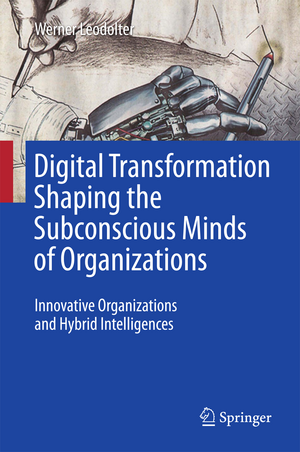Digital Transformation Shaping the Subconscious Minds of Organizations: Innovative Organizations and Hybrid Intelligences
Autor Werner Leodolteren Limba Engleză Hardback – 21 iul 2017
The author draws upon the psychological aspects of decision making, taking the reader from perception to analysis, conclusions and on to decision and action. Short, lucid stories support the conceptual ideas and form three narrations about the future of manufacturing, healthcare and retail. The effects of incorporating new technologies like sensors, visual analytics, decisionsupport, artificial intelligence and robotics are explored. The reader gains a comprehensive view on management and organizational behavior, both as it is now and expectations for the future.
This book will have wide appeal: information managers, strategists, organizational developers, management consultants and management students will find valuable support in this book which enables them to triumph in the digital transformation. The thought-provoking set of guiding principles and the ideas explored have something to offer to all those interested in the future of organizations, economics and society.
| Toate formatele și edițiile | Preț | Express |
|---|---|---|
| Paperback (1) | 356.45 lei 38-44 zile | |
| Springer International Publishing – 13 mai 2018 | 356.45 lei 38-44 zile | |
| Hardback (1) | 505.96 lei 22-36 zile | |
| Springer International Publishing – 21 iul 2017 | 505.96 lei 22-36 zile |
Preț: 505.96 lei
Preț vechi: 595.25 lei
-15% Nou
Puncte Express: 759
Preț estimativ în valută:
96.82€ • 101.34$ • 80.58£
96.82€ • 101.34$ • 80.58£
Carte disponibilă
Livrare economică 10-24 martie
Preluare comenzi: 021 569.72.76
Specificații
ISBN-13: 9783319536170
ISBN-10: 3319536176
Pagini: 254
Ilustrații: XXI, 254 p. 20 illus., 5 illus. in color.
Dimensiuni: 155 x 235 mm
Greutate: 0.6 kg
Ediția:1st ed. 2017
Editura: Springer International Publishing
Colecția Springer
Locul publicării:Cham, Switzerland
ISBN-10: 3319536176
Pagini: 254
Ilustrații: XXI, 254 p. 20 illus., 5 illus. in color.
Dimensiuni: 155 x 235 mm
Greutate: 0.6 kg
Ediția:1st ed. 2017
Editura: Springer International Publishing
Colecția Springer
Locul publicării:Cham, Switzerland
Cuprins
Introduction.- Considerations from Behavioral and Cognitive science.- Elements of an Organization's Infrastructure - Relevant Existing and Expectable Technologies.- A Model of an Organization - Mode of Action of the Subconscious Mind and the Consciousness of an Organization.- 5 How to Form an Organization and its Subconscious Mind.- Summary and Outlook.
Notă biografică
Univ. Prof. Dipl.-Ing . Dr. techn . Werner Leodolter is the CIO of KAGes. Previously, he served for 26 years in management positions in information management at various industrial companies and in the Styrian hospital GmbH (KAGes). From 2008 to 2013 he led KAGes (an Austrian hospital group with 17,000 employees) through a period of organizational realignment as its CEO. He is also a member of the Austrian Federal Ministry of Health’s telehealth services commission. He is a university professor of Applied Management Studies in Health Care at the University of Graz (KFU) and lecturer for Information Management at the Technical University Graz (TUG). He is also author of the book "The subconscious mind of organizations: New technologies - Thinking organizations new", published in German in summer 2015.
Textul de pe ultima copertă
This book offers a new framework for conceptualizing, managing and generally using new information and communication technologies, for example in decision support and artificial intelligence in organizations. The book supports managers to actively guide the digital transformation of an organization through its strong metaphor of the subconscious mind of organizations. By designing and developing the subconscious mind, future organizations will evolve as successful and sustainable “hybrid intelligences” with a significant share of artificial intelligence but the clear primacy of the human being.
The author draws upon the psychological aspects of decision making, taking the reader from perception to analysis, conclusions and on to decision and action. Short, lucid stories support the conceptual ideas and form three narrations about the future of manufacturing, healthcare and retail. The effects of incorporating new technologies like sensors, visual analytics, decision support, artificial intelligence and robotics are explored. The reader gains a comprehensive view on management and organizational behavior, both as it is now and expectations for the future.
This book will have wide appeal: information managers, strategists, organizational developers, management consultants and management students will find valuable support in this book which enables them to triumph in the digital transformation. The thought-provoking set of guiding principles and the ideas explored have something to offer to all those interested in the future of organizations, economics and society.
The author draws upon the psychological aspects of decision making, taking the reader from perception to analysis, conclusions and on to decision and action. Short, lucid stories support the conceptual ideas and form three narrations about the future of manufacturing, healthcare and retail. The effects of incorporating new technologies like sensors, visual analytics, decision support, artificial intelligence and robotics are explored. The reader gains a comprehensive view on management and organizational behavior, both as it is now and expectations for the future.
This book will have wide appeal: information managers, strategists, organizational developers, management consultants and management students will find valuable support in this book which enables them to triumph in the digital transformation. The thought-provoking set of guiding principles and the ideas explored have something to offer to all those interested in the future of organizations, economics and society.
Caracteristici
Supports the development of sustainable organizations which incorporate new technologies including artificial Intelligence Provides a conceptual model which is easy to follow, use and memorize – supported by lucid stories Covers the decision making process in organizations from perception to analysis, conclusions and decisions – due to change by new technologies Includes supplementary material: sn.pub/extras


















